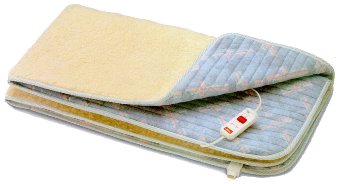How can we use our technology more intelligently?
In conclusion, the most reasonable attitude towards electrosmog![]() ,
as in many other fields, is to be "prudent" but not "terrified", because in the present circumstances there is nothing concrete to justify terror, not even in the stories which appear most frequently in the news.
,
as in many other fields, is to be "prudent" but not "terrified", because in the present circumstances there is nothing concrete to justify terror, not even in the stories which appear most frequently in the news.
Technical and operational improvements to reduce the risk are very welcome, of course, but inducing psychological stress in people may be more
harmful than the very enemy we want to defeat.
 |
| Fig. 1: Electric blanket. |
First, we must remember that the
simplest way to reduce a "dose![]() "
is to reduce exposure times or to move further away from the source. Another good piece of advice is to disconnect electrical appliances when not used. But be
careful and do not exaggerate…prudent avoidance
"
is to reduce exposure times or to move further away from the source. Another good piece of advice is to disconnect electrical appliances when not used. But be
careful and do not exaggerate…prudent avoidance![]() . For instance, switching off the electricity in the whole house before going to bed may be more dangerous than being exposed to the very weak electromagnetic field coming from the wire of your bedside lamp. On the other hand, it is strongly recommended to switch off your electric blanket (fig. 1) when you go to bed or, even better, use a normal blanket so you avoid sleeping rolled up in an "electric current".
. For instance, switching off the electricity in the whole house before going to bed may be more dangerous than being exposed to the very weak electromagnetic field coming from the wire of your bedside lamp. On the other hand, it is strongly recommended to switch off your electric blanket (fig. 1) when you go to bed or, even better, use a normal blanket so you avoid sleeping rolled up in an "electric current".
As nobody seems to want to give up the many gadgets offered nowadays by modern technology, it is not easy to be constructive in the face of such a complicated problem. All we can do is suggest some general guidelines and try to convince the user that the problem is "under control". And, as with all our day-to-day decisions, the user must rely on his common sense and concrete facts.
Some advice for public institutions and private citizens:
- Continue with investigations in order to improve knowledge and, as far as possible, remove doubts
- Give more cautious and more reliable information which convinces and reassures the public and helps them towards a "more appropriate usage" of all the goods on offer: no waste, no useless privations
- Build more trust between institutions and the public; intervene in a more humane way in order to encourage more cooperation and "healthier" attitudes.